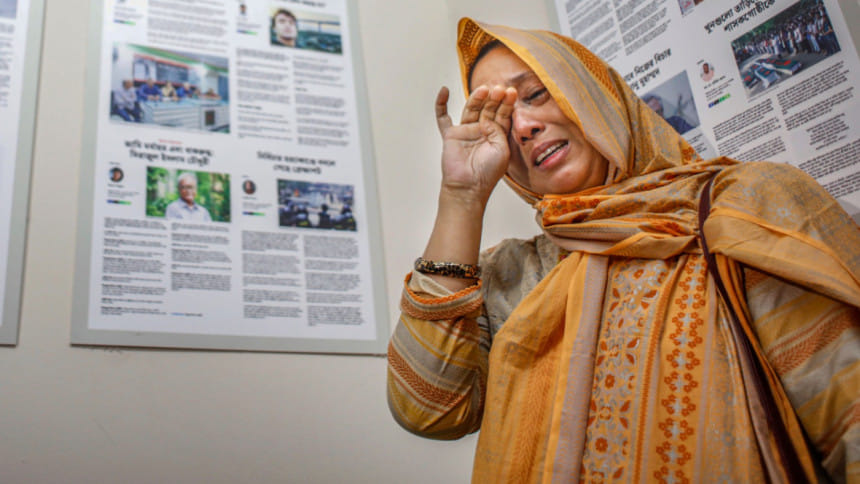Bereaved mothers of July martyrs mark day with memories, grief

For Mumtaz Begum, this Mother's Day began with a handmade card from her nine-year-old daughter.
But instead of feeling joy, it reopened a deep wound.
Her only son, 18-year-old Sheikh Shahriar Bin Matin, an HSC examinee, was fatally shot through the eye during the uprising in Dhaka's Mirpur-10 on July 18 last year.

He died two days later at Dhaka Medical College Hospital.
"Today brings so much pain to a grieving mother," Mumtaz said, her voice breaking.
"Other sorrows may fade with time, but the sorrow of losing a child never does."
Mumtaz reflects on the life that once was — a tight-knit family of four: her, her husband, Shahriar, and her daughter, ten years his junior.
"We were a small world," she said.
"Before my daughter was born, it was just the three of us. I miss that life terribly."
Like every year for the last 20 years, Mumtaz spent Eid at her in-laws' home in Mymensingh.
But without Shahriar, the celebration felt hollow this time.
"We used to go home with such joy. But this year, his seat remains empty. I didn't even know where I was going; it all felt meaningless," she said.
Shahriar had been the light of every Eid, visiting his six paternal aunts whom he affectionately called "Phippi", and partaking in family traditions like eating biryani and chaaler ruti (flatbreads made of rice flour) with beef.
"This year, I didn't cook anything," Mumtaz added. "I just couldn't."
Outside her window in Mymensingh, a pond that once echoed with the laughter and splashes of Shahriar and his cousins lies still.
"No one went in this time," she said.
"I just kept looking at the water and his grave, which are visible from my room."
Even in daily life, Shahriar's absence is overwhelming.
"He was so responsible," Mumtaz recalled.
"Once I ran out of gas at our home at Kuril, and he came all the way from a cousin's programme in Mirpur to refill it before returning to the event. Who does that?" she said.
"Every night, he'd place my inhaler and a glass of water next to my pillow. How can I forget those things?"
Her daughter now tries to lift her spirits.
"She's been making things for me all day. But my heart is stuck in the past," Mumtaz said.
"With Eid-ul-Azha coming, I keep thinking of how excited he used to be about bringing the cow. This year, there will be no joy."
Her husband Sheikh Abdul Matin does what he can to cope.
"Her pain is like an open wound," he said.
"I stay busy with work. And whenever it gets too heavy, I visit our son's grave. That's how we're getting by."
Jasmin Akter, too, continues to be haunted by memories of the son she lost.
She does not observe Mother's Day, but the grief of losing her only son, Jisan, and daughter-in-law, Mishti, is something she endures every single day.
Nineteen-year-old Jisan Ahmed, a water vendor, had just married his long-term partner Mishti Akter before their lives were tragically cut short.

Jisan was shot during a clash between protesters and law enforcement in Shonir Akhra on July 20.
Grief-stricken, Mishti stopped eating and just nine days later, took her own life.
"My whole world turned upside down after that," said Jasmin.
Her husband, a migrant worker in South Sudan, comes and goes but remains deeply shaken.
"He's a broken man after losing our only son. The house doesn't feel like home anymore."
Jasmin describes the emptiness she feels every day.
"Every day, I used to wait for my son to come back from work. I would find myself looking for my daughter-in-law without even realising it. That's when I knew I couldn't stay in that house, filled with their memories. So, I left," she said.
Now, living with her sister, Jasmin tries to find solace in her own way.
"I'm alone now, so I do what I can to get through the day. Sometimes, I visit Jisan's friends, and talking to them brings me some comfort."
She adds that, even now, she continues to scroll through his photos on Facebook, reliving the memories they shared.
"My son used to use Facebook on my phone. I still go through his pictures, his posts. His friends post memories too — I like them, comment on them, and share my own. That's how the days pass now."
This Eid-ul-Fitr, Jasmin could not even bring herself to cook.
Her health has worsened, and she is constantly drained.
"I suffer from migraines, my haemoglobin is low, and I'm constantly tired. Since my son's passing, my health has deteriorated," she said.
"A year ago, my life was brighter. I lived with my son and daughter-in-law. Now, all I have left are their memories."
For Fatema Begum, the grief is just as overwhelming.

Her son Mamun Hossain, a private car driver from Jalial village in Noakhali, was fatally shot on July 19 while returning home from his aunt's house in Dhaka's Shahinbagh.
The bullet struck his stomach on the Mohakhali flyover, and despite being rushed to multiple hospitals, Mamun passed away the following morning at 3:30am.
Since then, Fatema has been consumed by grief.
"My face has changed so much since his loss," Fatema said, her voice shaking with emotion.
"People around me ask, 'why are you so broken? You still have three other sons. Try to smile for them'. But they don't understand. Just as losing one finger doesn't mean the pain in your hand is less, losing one son doesn't ease the grief in my heart."
Fatema's son Mamun was the second of her four children, and the "cleverest" of them all.
"He had a unique gift for calming people with his gentle words and resolving conflicts effortlessly," she said.
"Everyone would listen to him. He was sweet-spoken and peaceful. If Mamun spoke, people would feel at ease."
Though Fatema never paid much attention to Mother's Day, her son expressed his love for her every day.
"I don't know much about Mother's Day, but my son... he showed his love every day," she said tearfully.
"If I was unwell, he'd feed me with care. Once, I got sick, when we had no money, he still took me to the hospital, bringing eight green coconuts and expensive pomegranates—things I never asked for. He said, 'If my mother isn't well, what good is money?'"
The pain of losing Mamun became even more apparent last Eid.
"I have three sons, but Mamun is missing. Last Eid, I had all four sons in the same panjabi-pajama. This time, my five-year-old grandson, Musab Rahman—Mamun's son—looked at me and said, 'I am your Mamun now. Don't cry'."
Fatema's eyes fill with tears as she recalls this heartbreaking moment.
Mamun had a favourite meal—ruti and vegetables, the way only his mother made it.
"No one else could make it like he liked. Even if someone else tried, he'd say, 'This isn't my mother's cooking'. It had to be from my hands."
Every morning, Fatema instinctively looks toward his grave, haunted by the loss.
"Mamun had only been in Dhaka for a month when the tragedy happened," she explained.
"Our financial condition wasn't good. He went to Dhaka to earn for the family, thinking of all of us. If I had known what was going to happen, I would never have let him go."

 For all latest news, follow The Daily Star's Google News channel.
For all latest news, follow The Daily Star's Google News channel. 








Comments